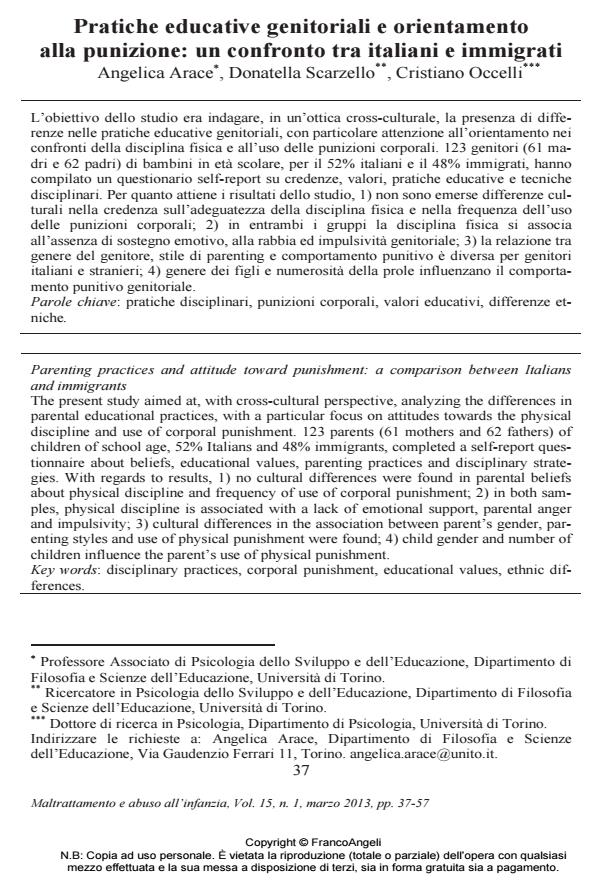Pratiche educative genitoriali e orientamento alla punizione: un confronto tra italiani e immigrati
Titolo Rivista MALTRATTAMENTO E ABUSO ALL’INFANZIA
Autori/Curatori Angelica Arace, Donatella Scarzello, Cristiano Occelli
Anno di pubblicazione 2013 Fascicolo 2013/1
Lingua Italiano Numero pagine 21 P. 37-57 Dimensione file 695 KB
DOI 10.3280/MAL2013-001003
Il DOI è il codice a barre della proprietà intellettuale: per saperne di più
clicca qui
Qui sotto puoi vedere in anteprima la prima pagina di questo articolo.
Se questo articolo ti interessa, lo puoi acquistare (e scaricare in formato pdf) seguendo le facili indicazioni per acquistare il download credit. Acquista Download Credits per scaricare questo Articolo in formato PDF

FrancoAngeli è membro della Publishers International Linking Association, Inc (PILA), associazione indipendente e non profit per facilitare (attraverso i servizi tecnologici implementati da CrossRef.org) l’accesso degli studiosi ai contenuti digitali nelle pubblicazioni professionali e scientifiche.
L’obiettivo dello studio era indagare, in un’ottica cross-culturale, la presenza di differenze nelle pratiche educative genitoriali, con particolare attenzione all’orientamento nei confronti della disciplina fisica e all’uso delle punizioni corporali. 123 genitori (61 madri e 62 padri) di bambini in età scolare, per il 52% italiani e il 48% immigrati, hanno compilato un questionario self-report su credenze, valori, pratiche educative e tecniche disciplinari. Per quanto attiene i risultati dello studio, 1) non sono emerse differenze culturali nella credenza sull’adeguatezza della disciplina fisica e nella frequenza dell’uso delle punizioni corporali; 2) in entrambi i gruppi la disciplina fisica si associa all’assenza di sostegno emotivo, alla rabbia ed impulsività genitoriale; 3) la relazione tra genere del genitore, stile di parenting e comportamento punitivo è diversa per genitori italiani e stranieri; 4) genere dei figli e numerosità della prole influenzano il comportamento punitivo genitoriale.
Parole chiave:Pratiche disciplinari, punizioni corporali, valori educativi, differenze etniche
- Parental practices of Italian mothers and fathers during early infancy: The role of knowledge about parenting and child development Donatella Scarzello, Angelica Arace, Laura Elvira Prino, in Infant Behavior and Development /2016 pp.133
DOI: 10.1016/j.infbeh.2016.06.006
Angelica Arace, Donatella Scarzello, Cristiano Occelli, Pratiche educative genitoriali e orientamento alla punizione: un confronto tra italiani e immigrati in "MALTRATTAMENTO E ABUSO ALL’INFANZIA" 1/2013, pp 37-57, DOI: 10.3280/MAL2013-001003